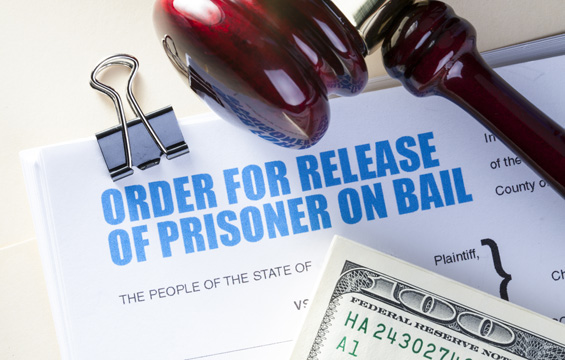The judge has discretion over bail, but what happens before you see the judge? How is bail determined before you go to court? Is the bail likely to increase, decrease, or stay the same when it does go to court? An experienced attorney, although unable to guarantee having bail reduced, could offer an opinion as to the above.
It would be best if, before you are arrested, you understand the fundamentals of bail, booking, and concept of over-booking. The more you know, the more money you may be able to save on bail. Below, I discuss the bail process, the common injustice of over-booking in regards to bail, and how a lawyer can possibly get bail reduced to save you money.
The Basics
After an arrest is made, for certain crimes, a person may not be released from jail pending trial unless money bail is paid to the court. The amount of bail required varies on a case-by-case basis, but the process of determining bail in every case remains the same.
The booking process is when, after the arrest, the officer at the jail enters into the system what crimes you were arrested for, i.e. what crimes he or she believes you to have committed. As you can read more about here, these allegations you are booked for do not necessarily reflect the charges that will actually be filed, as police do not make that determination.
Bail Schedules

Most counties have bail schedules. For example, the Alameda County Bail schedules can be found on the Alameda County Court’s website. The bail schedule instructs the jail how much bail to demand based on the charges under which the person was booked.
For instance, per the Alameda County bail schedule, felony “Hit and Run Causing Serious Bodily Injury or Death” (V.C. § 20001(b)) has a bail of $50,000. Thus, if you were arrested for felony “Hit and Run Causing Serious Bodily Injury or Death” in Alameda County, you can expect bail to be set at $50,000 before you go to court and see the judge.
In this way, neither the jail nor the police have discretion over bail in the same way that judges do.
When a Judge Determines Bail
Once the case is before the judge, the judge can raise or lower the bail based on the arguments made by the prosecutor and your attorney. For instance, the prosecutor may argue bail should be increased above the bail schedule amount based on; the defendant’s history of failures to appear, history of criminal acts, lack of ties to the community, or particular egregiousness of the case as compared to similarly charged offenses.
In contrast, the defendant’s attorney can argue that bail should be reduced below the bail schedule amount based on; the defendant’s inability to pay, lack of failures to appear, nonexistent criminal history (or perhaps only very little or very old criminal history), significant ties to the community, difference between the charges at booking compared to the charges actually filed, or because the nature of the case as alleged is relatively minor or mild compared to most other cases which allege the same type of violation.
Real Examples of Bail Being Reduced
In 2018, I argued in court regarding such things and had a $200,000 bail reduced to $45,000. In 2020, comparable arguments resulted in my client’s bail reduced from $2.5 million to $250,000. In 2022, I had a client’s bail reduced from $110,000 to Release on his Own Recognizance (O.R.), which means $0 bail.
How Police Exercise Discretion Over Bail
Although the judge gets the final say regarding bail, for several days before the case goes to court, it is the police who have control over the amount of bail. Although bound by the bail schedule, police decide which charges, and how many, to book an individual under (again, these are not necessarily the charges that will actually be filed). It is not uncommon for police to book heavy-handedly by booking people under every duplicative and farfetched theory of the crime they can imagine. This “over-booking” can make the bail unfairly high, at least until the case goes before the judge.
For example, in a case where a man was accused of resisting arrest, eight police officers allegedly participated in trying to subdue him. When he was booked, he was booked under eight counts of resisting arrest, with $20,000 bail for each of them, totaling $160,000. When he appeared in court, days later, the prosecutor charged him (more fairly) with only one count of resisting arrest, and the judge therefore lowered the bail respectively to $20,000 total.
In another case, a man was booked under two counts of felony robbery, one count felony domestic violence, and one count of misdemeanor vandalism, for a total of $150,000 bail. When he went to court, the prosecutor had charged the man with only misdemeanor vandalism, believing the facts as alleged in the report did not constitute a robbery or a battery. The man was given O.R. (bail reduced to $0) by the judge in court.
How to Save Money on Bail
Why does this matter? It matters because if you contract with a bail bond company to bail you out, the price you pay them is based on the amount of the current bail (usually 10%), and if that bail later goes down, or is made $0, the bail bond company is unlikely to refund you the difference, or cancel your remaining obligation to pay 10% of what the bail once was. Thus, in the last example, the man would have saved $15,000 of his own real money if he stayed in jail for 2 days until his court date without bailing out, when the judge would have lowered his bail to $0.
Of course, jail is awful, and this man didn’t know all of this, and there was also no guarantee bail would be reduced at his first court date.
If you can tolerate staying in jail until your first court date, and your bail is then reduced by the judge at your first court date (or maybe you’re not even charged at all by then, and are simply released from jail without having to pay any bail) you can potentially save a lot of money.
A Separate Injustice Regarding Over-Booking
Another way in which the practice of over-booking can affect an individual, is it can extend the amount of time the person has to wait to Petition to Seal their Arrest Record. If a police officer decides, in his or her discretion, to book a suspect on suspicion of felony domestic violence charges, rather than suspicion of misdemeanor domestic violence charges, the one-year waiting period to Petition to Seal the Arrest Record would be extended to 3 years because the Statute of Limitations for felony domestic violence is two years longer than its misdemeanor counterpart, and the Statute of Limitations needs to expire to become eligible to Seal the Arrest Record.
If you are considering posting bail for a loved one who has just recently been arrested, or just reading this academically for yourself, you should consult with an attorney if you are able to prior to posting bail, to see if an attorney expects the bail to be reduced at the arraignment, because if you contract with a bail bond company before bail is reduced, you could possibly regret it!

